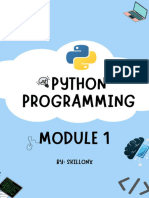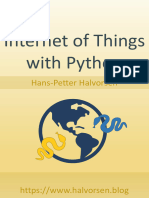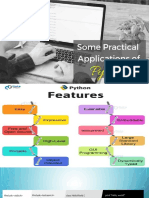Important Python Modules
Uploaded by
HTP 77Important Python Modules
Uploaded by
HTP 77Important Python Modules
tell me some imp module in python as a python programmer , as u know i do dsa in py so i know
basics very good and have some good exp with django
Since you already have a strong grasp of Python basics, DSA, and Django, you should focus on
mastering the following important Python modules that can enhance your efficiency and broaden your
capabilities as a Python developer:
1. Standard Library Modules (Core Python)
These are must-know for writing efficient and Pythonic code.
`functools` – Higher-order functions, caching (`lru_cache`), partial functions, etc.
`itertools` – Useful for iterators, permutations, combinations, product, cycle, etc.
`collections` – Includes `defaultdict`, `Counter`, `deque`, `namedtuple`, etc.
`heapq` – Implements a priority queue (min-heap by default).
`bisect` – Binary search and insertion in sorted lists.
`dataclasses` – Simplifies class creation with minimal boilerplate.
`typing` – Type hinting (`List`, `Tuple`, `Dict`, `Callable`, etc.).
`operator` – Efficient in-built operators for functional programming.
`math` – Mathematical operations, factorial, GCD, etc.
`random` – Random number generation, shuffling, seeding.
`decimal` & `fractions` – Precise decimal calculations.
2. DSA-Specific Modules
Since you solve DSA in Python, these modules are useful:
`numpy` – If you work with large arrays/matrices, NumPy speeds up numerical computations.
`scipy` – Advanced mathematical functions (useful in scientific computing).
`networkx` – Graph algorithms and visualization.
`sympy` – Symbolic mathematics (useful for number theory, combinatorics).
`pygraphviz` & `graphviz` – Useful for visualizing graphs.
3. Web Development & APIs
Since you work with Django, these are important for APIs and web apps:
`requests` – For making HTTP requests (GET, POST, etc.).
`httpx` – An async alternative to `requests`.
`beautifulsoup4` & `lxml` – For web scraping.
`selenium` – For browser automation.
`fastapi` – If you ever need a modern async API framework (alternative to Django).
`pydantic` – Data validation (used in FastAPI).
4. File Handling & OS Modules
Printed using ChatGPT to PDF, powered by PDFCrowd HTML to PDF API. 1/2
`os` – Interacting with the operating system.
`shutil` – File operations (copy, move, delete).
`pathlib` – Object-oriented way to handle file paths.
`json` & `pickle` – Working with structured and serialized data.
`csv` – Handling CSV files.
5. Performance & Optimization
`multiprocessing` – Parallel processing using multiple cores.
`threading` – Multithreading (though limited by GIL).
`asyncio` – Asynchronous programming (ideal for network I/O).
`cProfile` & `timeit` – Profiling and performance measurement.
`cython` – Speed up Python code by compiling to C.
6. Security & Encryption
`hashlib` – Secure hash functions (SHA256, MD5, etc.).
`hmac` – Message authentication.
`cryptography` – Secure encryption and decryption.
7. AI/ML & Data Science (If Interested)
`pandas` – Data analysis and manipulation.
`scikit-learn` – ML models and preprocessing.
`tensorflow` / `torch` – Deep learning frameworks.
8. Miscellaneous
`loguru` – An improved logging library.
`rich` – Beautiful CLI output.
`tqdm` – Progress bars.
`pyperclip` – Clipboard interaction.
`pyautogui` – Automate GUI interactions.
Would you like a deeper explanation or a tutorial for any of these?
Printed using ChatGPT to PDF, powered by PDFCrowd HTML to PDF API. 2/2
You might also like
- Industrial Internship: WEEK 7 (FROM JUN 7, 2021 TO JUN 11, 2021)No ratings yetIndustrial Internship: WEEK 7 (FROM JUN 7, 2021 TO JUN 11, 2021)5 pages
- python-full-stack-development-summer-internship-reportNo ratings yetpython-full-stack-development-summer-internship-report43 pages
- Intro_to_Python_Libraries_&_Modules.c4cdd7173ec260b8cbc4No ratings yetIntro_to_Python_Libraries_&_Modules.c4cdd7173ec260b8cbc429 pages
- [Ebooks PDF] download High Performance Python 2nd Edition Micha Gorelick full chapters100% (1)[Ebooks PDF] download High Performance Python 2nd Edition Micha Gorelick full chapters40 pages
- PDF High Performance Python 2nd Edition Micha Gorelick download100% (3)PDF High Performance Python 2nd Edition Micha Gorelick download50 pages
- Python Programming Versatile High Level Language for Rapid DevelopmentNo ratings yetPython Programming Versatile High Level Language for Rapid Development589 pages
- Python Guide Documentation: Release 0.0.1No ratings yetPython Guide Documentation: Release 0.0.1167 pages
- Python:: Python Is An Interpreted, High-Level, General-Purpose Programming Language. Created byNo ratings yetPython:: Python Is An Interpreted, High-Level, General-Purpose Programming Language. Created by24 pages
- Machine Learning with Python: A Comprehensive Guide with a Practical ExampleFrom EverandMachine Learning with Python: A Comprehensive Guide with a Practical ExampleNo ratings yet
- Chemistry Set 1, Model Papers of Madhya Pradesh Board of Secondary Education, XIIth Class100% (1)Chemistry Set 1, Model Papers of Madhya Pradesh Board of Secondary Education, XIIth Class24 pages
- 3. SECURE - Benchmarking Generative Large LanguageNo ratings yet3. SECURE - Benchmarking Generative Large Language14 pages
- Foxboro Control Software Scripting With Direct Access User's Guide100% (1)Foxboro Control Software Scripting With Direct Access User's Guide294 pages
- 23.08.16 - Votol controller and DKD display explainedNo ratings yet23.08.16 - Votol controller and DKD display explained3 pages
- STROBE Checklist v4 Combined PlosMedicine - ReviewerNo ratings yetSTROBE Checklist v4 Combined PlosMedicine - Reviewer5 pages
- Modeling A Part Using Surfaces: Publication Number Spse01560No ratings yetModeling A Part Using Surfaces: Publication Number Spse01560341 pages
- ARB 102 Assignment (Spring 2021) : TopicNo ratings yetARB 102 Assignment (Spring 2021) : Topic5 pages
- JHi 5 SJ 8 Oa FQTSMJ W8 L RFM 2 JJ 9 P MK VK7 I LNMM Ko Hy 7 G NCNo ratings yetJHi 5 SJ 8 Oa FQTSMJ W8 L RFM 2 JJ 9 P MK VK7 I LNMM Ko Hy 7 G NC1 page
- Technology Collaborative Tools in The Digital World: Lesson 3No ratings yetTechnology Collaborative Tools in The Digital World: Lesson 35 pages
- BSAB-Intermediate Microeconomic Theory..No ratings yetBSAB-Intermediate Microeconomic Theory..11 pages
- EUV photolithography Resist progress and challenges (JSR)No ratings yetEUV photolithography Resist progress and challenges (JSR)15 pages

























































































